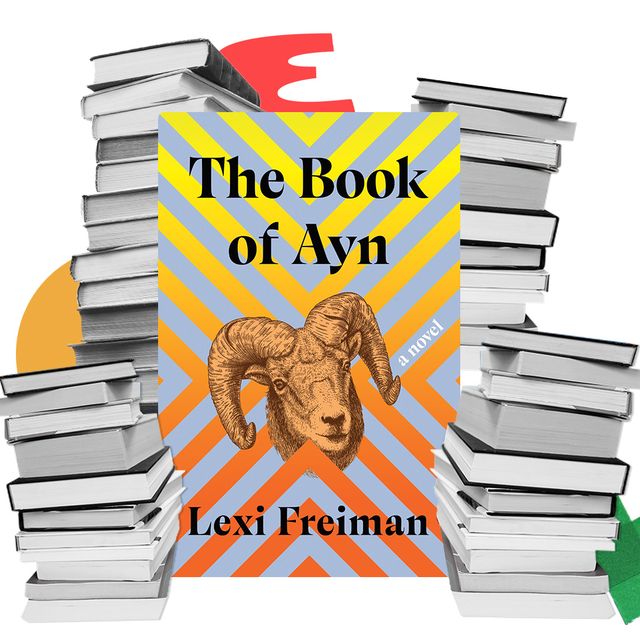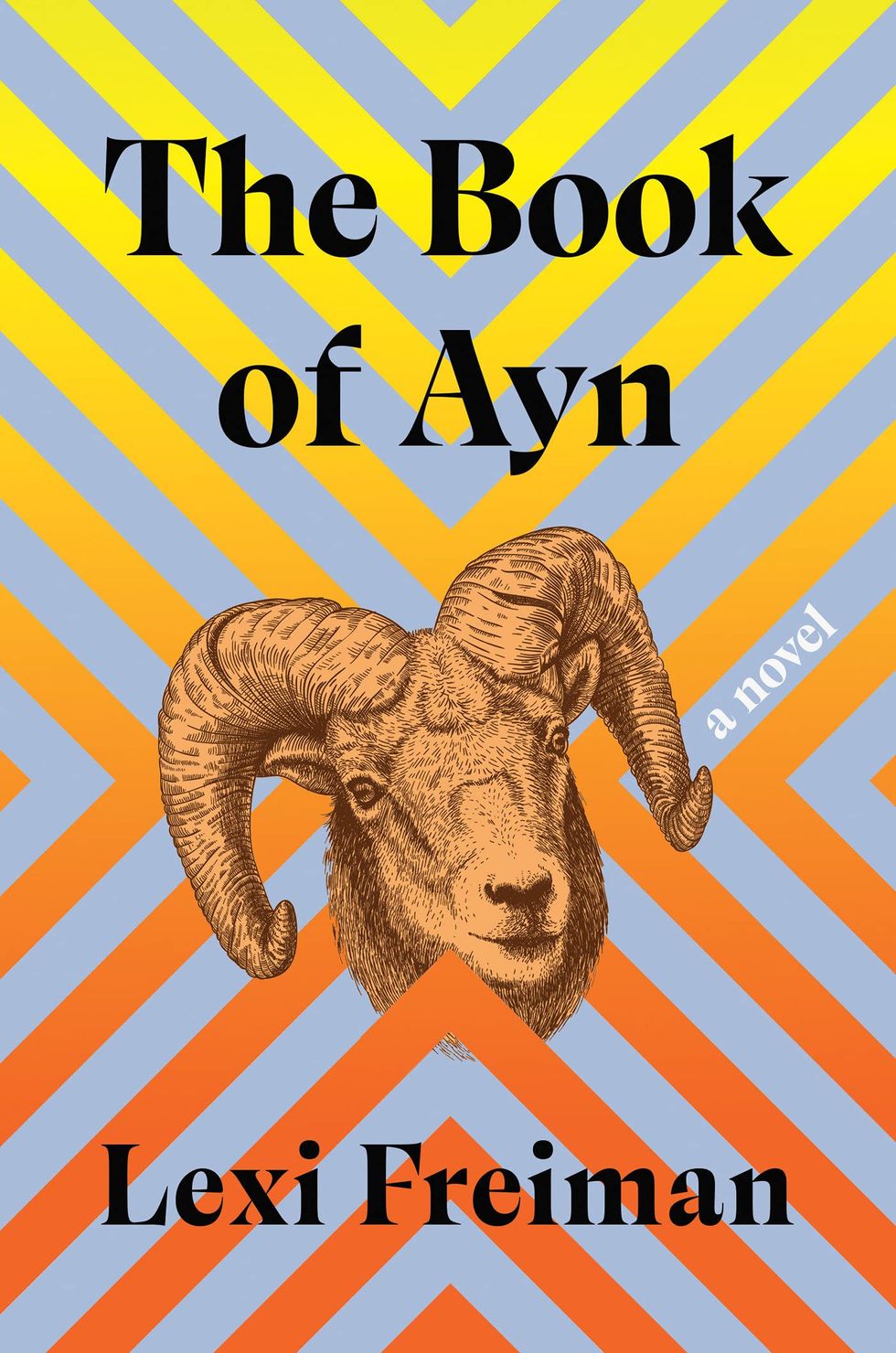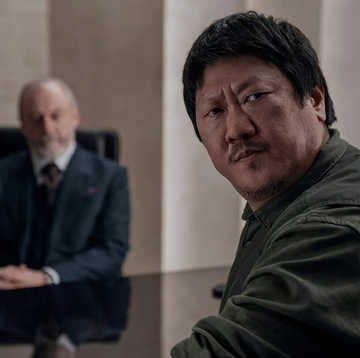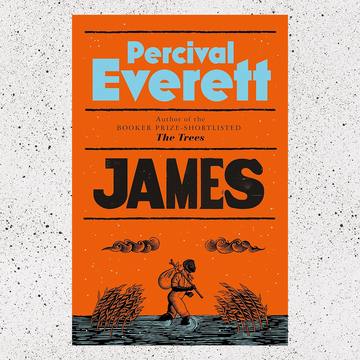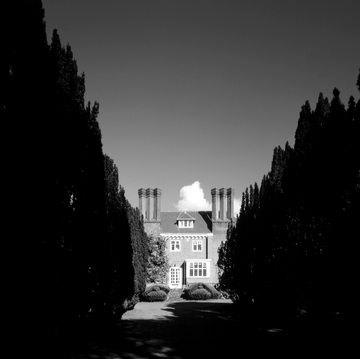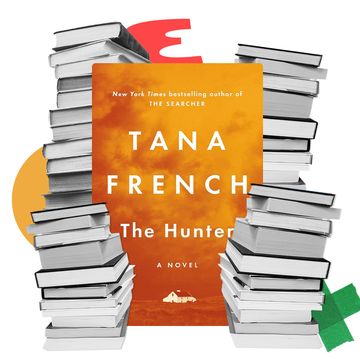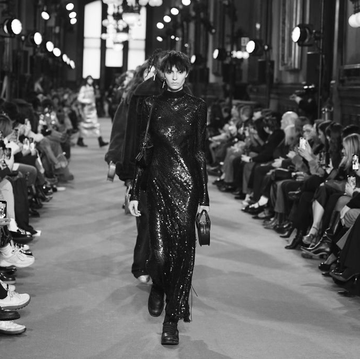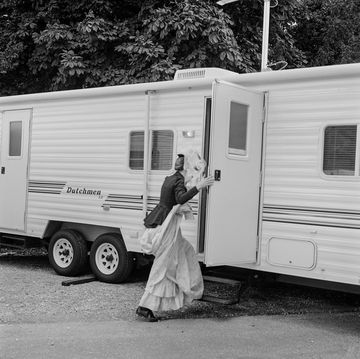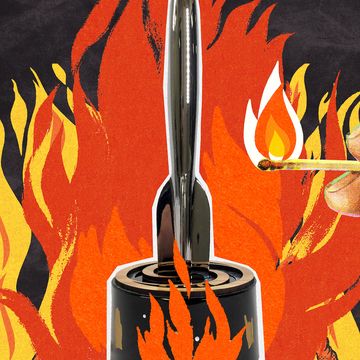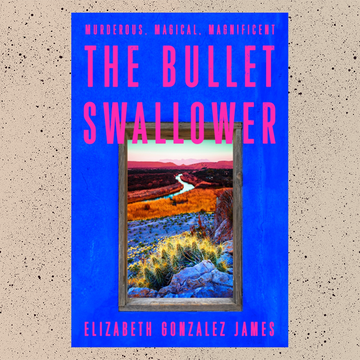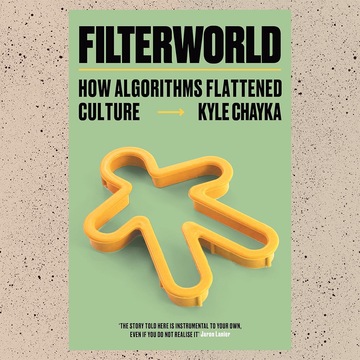When Lexi Freiman sat down to write her second novel, she discovered an irresistible subject in Ayn Rand, the polarising (albeit influential) Russian-American writer. “I'm always drawn to people who are sort of persona non grata, and she’s so despised,” Freiman tells Esquire. “I just published a satire of identity politics, so I wanted to see how much more unpopular I could make myself, and she seemed like a good choice.”
The Book of Ayn builds off the themes of Freiman’s irreverent debut, Inappropriation, in which a high school girl naively tries to model her life after Donna J. Haraway’s A Cyborg Manifesto. This time around, the protagonist, Anna, a self-described contrarian, takes a liking to Rand’s fiercely libertarian philosophy after falling victim to the cancel culture mob—a spectre that now haunts any artist. Her infraction? Publishing an opioid epidemic novel lampooned by The New York Times. “The review claimed that I was economically insensitive and had exploited the working class for my own selfish ends,” Anna recounts.
Feeling down on her luck, she ventures to sunny Los Angeles so she can churn out content about Rand that’s designed to garner outrage. After her Hollywood plan sputters, she heads to a meditation commune on a Greek island to absolve herself of all her woes—success, identity, reputation, and most notably, her ego. Through presenting the attention economy as a Randian hellscape where everyone, regardless of pedigree, has to fend for likes and exposure, Freiman spares no one—not Peter Thiel-funded edgelord hipsters, not fitness influencers uploading their vapidity into the algorithmic abyss, and certainly not the curators of a dying culture who have to keep up a pretense that any of it matters.
Yes, this is all very, very absurd. But thanks to Freiman’s unique ability to meld ferocious irony with heartfelt contemplation, The Book of Ayn goes beyond just another indictment of millennials as narcissists and offers a fresh glimpse into how 21st century artists have to negotiate their sense of selfhood. A few weeks prior to the release of The Book of Ayn, Freiman Zoomed with Esquire from Nicosia, Crete, where she was staying at a friend’s home, to discuss why she turned to Rand as a source for inspiration, Jewishness in writing, her lunch with comedian Louis C.K., ego death, and why the novel is still a valuable medium for exploring fiercely debated issues.
This interview has been edited for length and clarity.
ESQUIRE: In your debut novel Inappropriation, Ziggy, the fifteen-year-old protagonist, devotes herself to Donna Haraway’s feminist text A Cyborg Manifesto. Anna in The Book of Ayn is older and more cynical. But, analogously, she becomes obsessed with jamming her own life into Ayn Rand’s framework of individuality. Can you speak to this tendency of using public intellectuals as a roadmap for the complexities of life? Does this stem from a personal experience that you've had?
LEXI FREIMAN: The spark of interest always comes from someone else’s text. With Donna Haraway, there were ideas about transhumanism that felt really interesting to me within the context of identity politics. That was the kernel of an idea for that book. In a way, you’re finding or creating a character that doesn't just serve the ideas, but you find the character's qualities, flaws, and tendencies almost as a product of the ideas that you want to explore. I had the same thing with Ayn Rand. I started reading her books, and the thing that I found interesting about her was that she was a public intellectual and also a novelist and artist. Her books are unbearable. She wrote novels and a lot of people love them.
That was another thing that felt interesting to me for the character of Anna: she is exploring these ideas of freedom and individuality and the collective. I feel like there’s always that tension at the heart of the artist’s psyche. We want to be unique and original individuals who are creating great works. We also have a sense of wanting to belong and a desire to transcend the ego. That also means transcending the self and touching the sublime if you’re going to write something great. The idea of wanting to be part of something larger than oneself is a big part of every human experience. But there’s a special tension there with an artist that I thought would be interesting [to explore in a novel].
I learned so much about Rand from your book. For instance, I didn’t know that she changed her name from Alisa Rosenbaum at Ellis Island after leaving the U.S.S.R. Anna muses how “Ayn’s Jewishness has shaped her thinking” and reflects on how “there was a strong sense of individualism and collectivism within Jewish culture.” What was Rand’s relationship to Judaism?
With Ayn Rand, it’s hard to separate her Jewishness from her biography and her historical trajectory as someone who was born in 1905, came of age during World War I, and then emigrated in the late 1920s. She witnessed how her father had his pharmacy taken away [by the communists]. She was literally there the day that they [the communists] came in and beat him and he fell to his knees. She watched her father have everything he worked for taken away from him, and that was a huge seminal moment for her hatred of socialism. She came to the U.S. and didn’t want any of her background to affect her freedom—being raceless, without a religion, and without a gender; she didn’t really use her feminine charm. I read a few biographies and there was nowhere I saw her speak of or encounter antisemitism. She never really acknowledged her Jewishness publicly. She was very against this idea of identifying oneself through any groups or affiliations because she felt that took away a person’s freedom.
As a Jewish writer, this question of what it actually means for a work of art or ideology to be shaped by Judaism was interesting to me. Can you elaborate on that idea of Jewishness in writing?
For me, it’s about having a really acute awareness both of privilege and power, and then a sense of responsibility or accountability. I don't want to talk about Israel. I feel like a huge problem with that is that we're doing too much talking and not enough listening, so I don't want to add to the noise. But it’s like having a sort of awareness of oneself both as victim and perpetrator. That's very strong. I don't even like that language. But in a sense, I think that's really useful because there's an opportunity for enormous humaneness when you don’t see yourself as a pure victim and you don’t see yourself as a guilty perpetrator. I think it’s important to be able to see yourself as both in different contexts, and most importantly, to not punish yourself and to be merciful. That's a big part of what I got out of all my Ayn Rand reading: this idea that in order to actually be generous in an authentic way, you have to be self-serving. To be loving or merciful to others, you have to be that for yourself first. In Jewishness, there is an opportunity to be very self-aware and have compassion for the pain of the past, and to try to imagine good ways of working through that in the future.
Towards the end of the book, after Anna’s partner declines her request to strangle her, she reflects, “Sexual strangulation was one of the individual’s great freedoms. You had to reclaim this right from all the boring feminists who said it was just misogyny. But now I wondered, was it really freewill when being choked was the only way you can come? Was that really a choice you had made for yourself?” You do a fantastic job exploring how kinky sex may or may not be predetermined by cultural conditioning via pornography. Anna is a compelling character because she sees all sides of an issue. What’s the relationship between kink and free will?
Thanks, I think that comes with my mild OCD. There’s a [constant] sense of, “Have I covered all my arguments and counterarguments?” That was a part of writing this character who’s pretty paranoid that she has been cancelled, and so there’s always a sense of, “Oh fuck, am I being narcissistic again? How will this be perceived? Have I said the wrong thing?”
But yes, back to kinky sex. I was interested in what is a choice and what is not a choice, and how much does that matter. I go back and forth on this. It's easy to moralise and say that this is trauma and you have to overcome this proclivity because it's destructive. But there are ways of reframing that, once you have awareness of a thing. With that comes a choice that may not be about not doing the thing anymore, but thinking about it differently. Going into the thing with awareness just sucks some of the negative energy out of it. In terms of violent porn, I feel that stuff is a problem because it's so ubiquitous and accessible, and there’s so much addiction. The bigger problem is that people have very little control over their impulses, and that has come with the internet age. We have totally given up our willpower to these devices. This all ties back into ideas of self-responsibility. Now I sound like Jordan Peterson or something, and I am sorry.
That’s an interesting point that you touched on with getting OCD about whether or not you’re cancelled. It’s as if this thing we call “cancel culture” serves as surveillance. For instance, at the end of the book, Anna is on a secluded island, but she still feels haunted by the possibility of backlash, think pieces, and discourse. What does it actually mean to be cancelled?
I don’t know. Maybe I’m about to find out. Being cancelled is maybe an opportunity for ego death, and that’s really the most idealistic and positive way of thinking about it. That’s what I was exploring in this book, and I was thinking about it in an essay that I wrote about Louis C.K. At our lunch last year, [C.K. and I] ended up discussing this idea of ego death. In the end, even though we both agreed it would be a nice thing to be enlightened, I was really struck by something he said that as painful it is to have an ego, especially when it’s been trampled on, he wouldn’t give it up, because it’s part of what you need as an artist to make great work. It keeps you alive.
I personally struggle with the idea of ego death because I want to write books and I don’t think the two things are possible. If you were really enlightened, you wouldn’t even want to write books. So, yes, being cancelled just sucks. You think about how some artists get to a point where the whole thing is empty and meaningless and they start looking for a spiritual out. It makes you sort of think, “What’s the point of all of this if Jim Carrey is seeking enlightenment now?” Getting cancelled could be an opportunity to get enlightened.
That reminds me of how Ye, formerly known as Kanye West, got super religious and then he got super super cancelled. It was almost as if he was trying to get cancelled on purpose.
There’s something interesting about an artist like Kanye who is so transgressive, and that’s part of his genius. It’s a blurry line with Kanye—the antisemitism stuff wasn’t a blurry line—but with him, there’s always this sense of whether or not he’s fucking with us and blowing our minds open. Or does he have no idea what he’s doing? Madness is the ultimate transgression. In the book, I talk a little bit about how we’re really hard on our big superstars in terms of their behaviour, but we have to separate the artist from the art as much as possible and just acknowledge that these are not normal people. These people are living very strange lives. Part of my issue with the left is that it’s very punitive and at the same time, there’s an openness for some people for rehabilitation.
There’s a contradiction—some people get rehabilitated based on their circumstances and other people need to be destroyed. I don’t really believe in anyone who is trying to destroy anyone else, because this isn’t part of an ideology that comes from an integrated, synthesised worldview and a solid, compassionate, generous place. I don’t have the answers. I don’t know how you have an effective movement like #MeToo without some consequences. There’s obviously a spectrum of crimes and bad behaviour. [But] there’s an impulse there that I think is unhealthy for everyone.
It seems to me that the throughline here is fluidity and grappling with the contradictions of being an individual. Do you expect yourself to one day disavow The Book of Ayn altogether?
Maybe. I don’t want to disavow anything or embrace anything. I don’t want to ever think that I have the answer. In this book, mostly, I don’t think this character has the answer because I don’t have the answer. I may disavow the whole project of writing books. I still think that the better project is trying to get enlightened. I do go to a spiritual commune that isn’t dissimilar to the place in the book. If I have ever disavowed something, I have probably embraced something that’s just as limiting, so hopefully not.
We are all too quick to want to have the right philosophy and ideology. That’s why I like writing novels, because there’s room in there for everything. Room to work through the ideas and work through the problems. Maybe through this process that’s a little bit OCD, you get to this point where you're like, “Oh, none of those ideas are good.”
I guess there's still more to come, hopefully.
Daniel Spielberger is a writer based in Los Angeles. His work has appeared in Los Angeles Review of Books, VICE, NBC News, W Magazine, and numerous other outlets.
